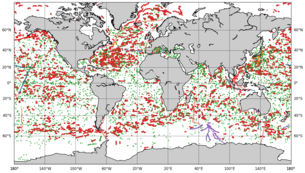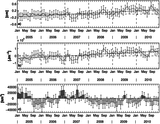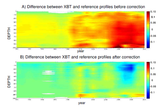
Global Ocean
CORA
| The CORA dataset (Coriolis Ocean Dataset for Reanalysis) aims to diffuse all types of in-situ temperature and salinity measurements with a maximal sampling, including high frequency profilers (ARGO, CTD, etc...) surface and sub-surface timeseries (Thermosalinographs and surface drifters, etc...). The current version of the CORA dataset (CORA5.0) stands out from the previous version by the intake of millions profiles from the historical period (1950-1990) and the intake of year 2015 profiles from Coriolis. A very careful validation process is performed on the CORA measurements since the probably erroneous profiles are individually checked by an oceanographer which changes the data quality flags if necessary. This work flow reduces the amount of unnecessary flags leading to a better estimation of the ocean variability. Last, a correction is applied on the XBT measurement depth following the method bu Hamon et al. 2012. The CORA dataset is distributed by the Copernicus Marine and Environement Service online catalogue: Product User Manual and Documentation are also distributed by Copernicus. |
|
GOIs
Argo temperature and salinity measurements during the period 2005 to 2010 are used to estimate GOIs such as GOHC (Global Ocean Heat Content) and GSSL (Global Steric Sea Level).
ISAS
The LPO ( Laboratoire de Physique des Océans) has developped a analysis system in collaboration with Coriolis project. This system is operated at Coriolis Data Center to generate the weekly gridded product that is distributed by Coriolis.
Empirical and statistical correction of eXpendable Bathy Thermograph
R&D Coriolis team uses Hamon et al 's method to correct the temperature offset and depth bias due to unrealistic fallrate equation.
Advanced Variables
CORIOLIS R&D team distributes products on advanced ocean variables : mixed-layer depth, barrier layer, thickness...


